UNC Health and Human Rights Lecture Series
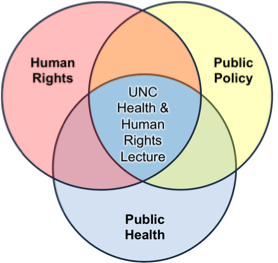 2012
2012
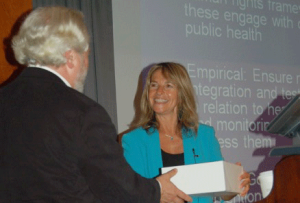 In collaboration with the UNC In collaboration with the UNC Center for Bioethics and UNC Institute for Global Health & Infectious Disease, the Department of Public Policy launched the Lecture Series to great publicity and acclaim in Spring 2012, bringing Professor Sofia Gruskin to UNC for two days of faculty meetings, student events, and a university-wide lecture.
In collaboration with the UNC In collaboration with the UNC Center for Bioethics and UNC Institute for Global Health & Infectious Disease, the Department of Public Policy launched the Lecture Series to great publicity and acclaim in Spring 2012, bringing Professor Sofia Gruskin to UNC for two days of faculty meetings, student events, and a university-wide lecture.
2013
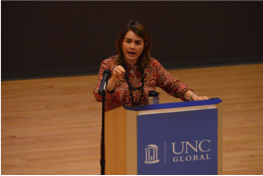 Participating in the University’s the Pan-Campus Water Theme, the Department invited Catarina de Albuquerque, the UN Special Rapporteur on the human right to safe drinking water and sanitation, to give the 2013 Lecture, with additional partner funds to speak to three classes, produce two online videos for the University, and publicize her Health & Human Rights Lecture to a filled Nelson Mandela Auditorium.
Participating in the University’s the Pan-Campus Water Theme, the Department invited Catarina de Albuquerque, the UN Special Rapporteur on the human right to safe drinking water and sanitation, to give the 2013 Lecture, with additional partner funds to speak to three classes, produce two online videos for the University, and publicize her Health & Human Rights Lecture to a filled Nelson Mandela Auditorium.
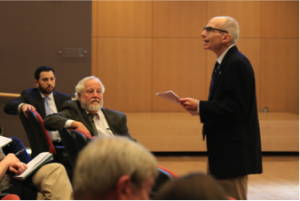 2014
2014
Professor Lawrence Gostin, one of the preeminent leaders at the intersection of global health and human rights, provided the 2014 Health & Human Rights Lecture, participating in interviews with faculty and students, providing a keynote to UNC’s Mock World Health Organization competition, and speaking about his groundbreaking new book, Global Health Law.
2015
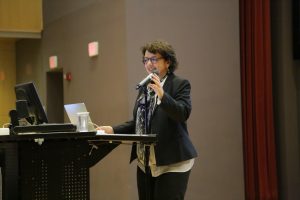 In recognizing the role of human rights in framing global health governance, the 2015 Health & Human Rights Lecture was given by Veronica Magar, the Team Leader on Gender, Equity, and Human Rights at the World Health Organization. A graduate of UNC, Dr. Magar spoke about her Team’s efforts to “mainstream” human rights across the World Health Organization and the ways in which human rights will be central to health efforts under the Sustainable Development Goals.
In recognizing the role of human rights in framing global health governance, the 2015 Health & Human Rights Lecture was given by Veronica Magar, the Team Leader on Gender, Equity, and Human Rights at the World Health Organization. A graduate of UNC, Dr. Magar spoke about her Team’s efforts to “mainstream” human rights across the World Health Organization and the ways in which human rights will be central to health efforts under the Sustainable Development Goals.
2016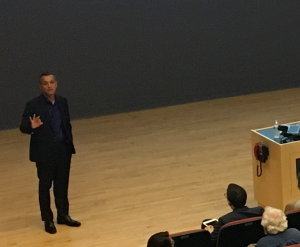
Dr. Gopal Sreenivasan, the Crown University Professor in Ethics at Duke University, gave the 2016 Health & Human Rights Lecture. The first philosopher to give the lecture, Dr. Sreenivasan investigated the significance of health care and public health to the conceptualization and realization of the human right to health.
2017
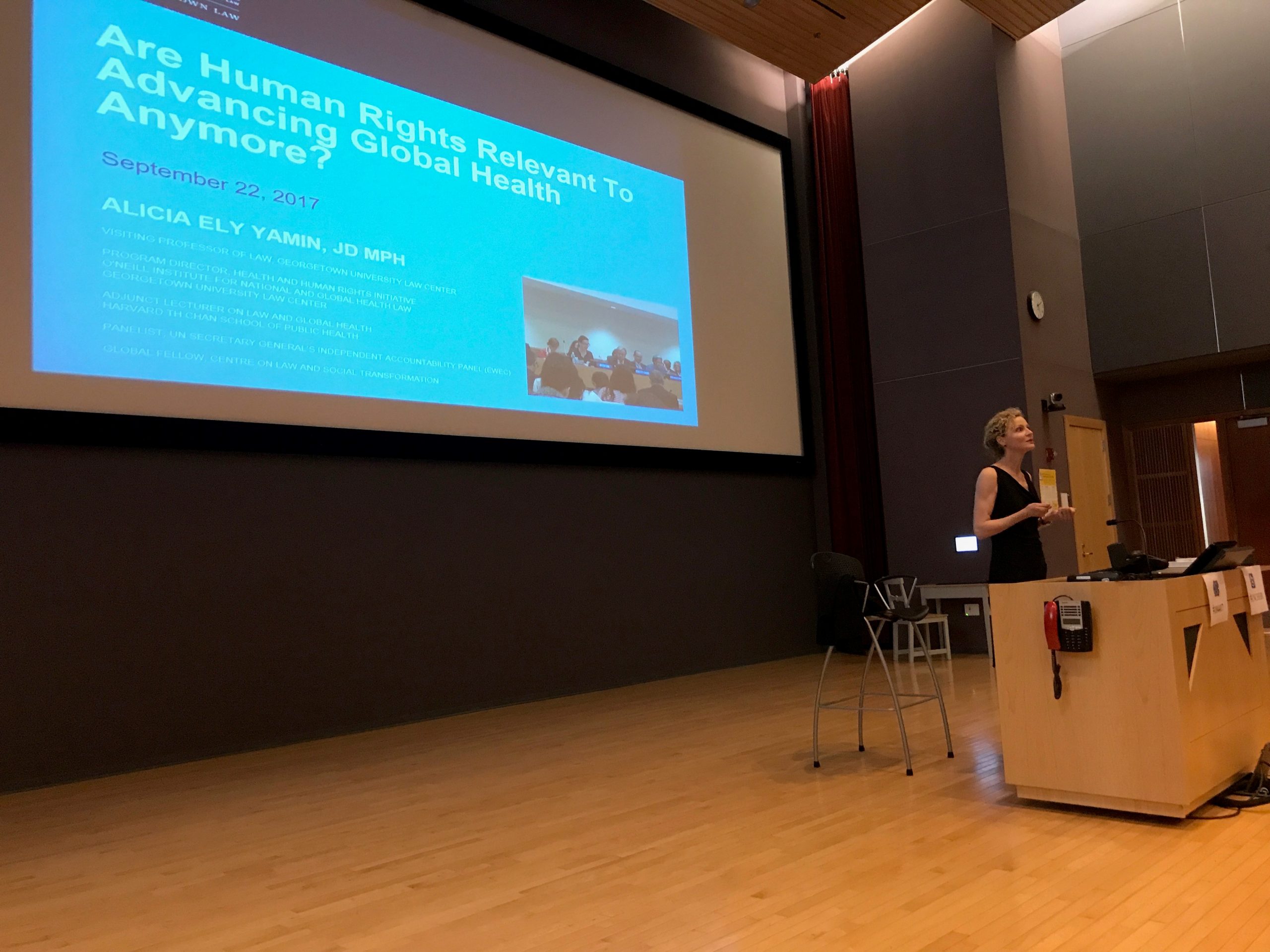 Professor Alicia Ely Yamin, the Program Director of the Health and Human Rights Initiative at the O’Neill Institute for National & Global Health Law, described the current policy challenges to using the human rights framework to promote health, placing these challenges in historical context. Drawing from her advocacy in the field, Professor Yamin’s work provided a basis to analyze shortcoming in the ways that human rights frameworks and human rights-based approaches are sometimes applied and why this should concern human rights advocates in creating real change in people’s lives.
Professor Alicia Ely Yamin, the Program Director of the Health and Human Rights Initiative at the O’Neill Institute for National & Global Health Law, described the current policy challenges to using the human rights framework to promote health, placing these challenges in historical context. Drawing from her advocacy in the field, Professor Yamin’s work provided a basis to analyze shortcoming in the ways that human rights frameworks and human rights-based approaches are sometimes applied and why this should concern human rights advocates in creating real change in people’s lives.
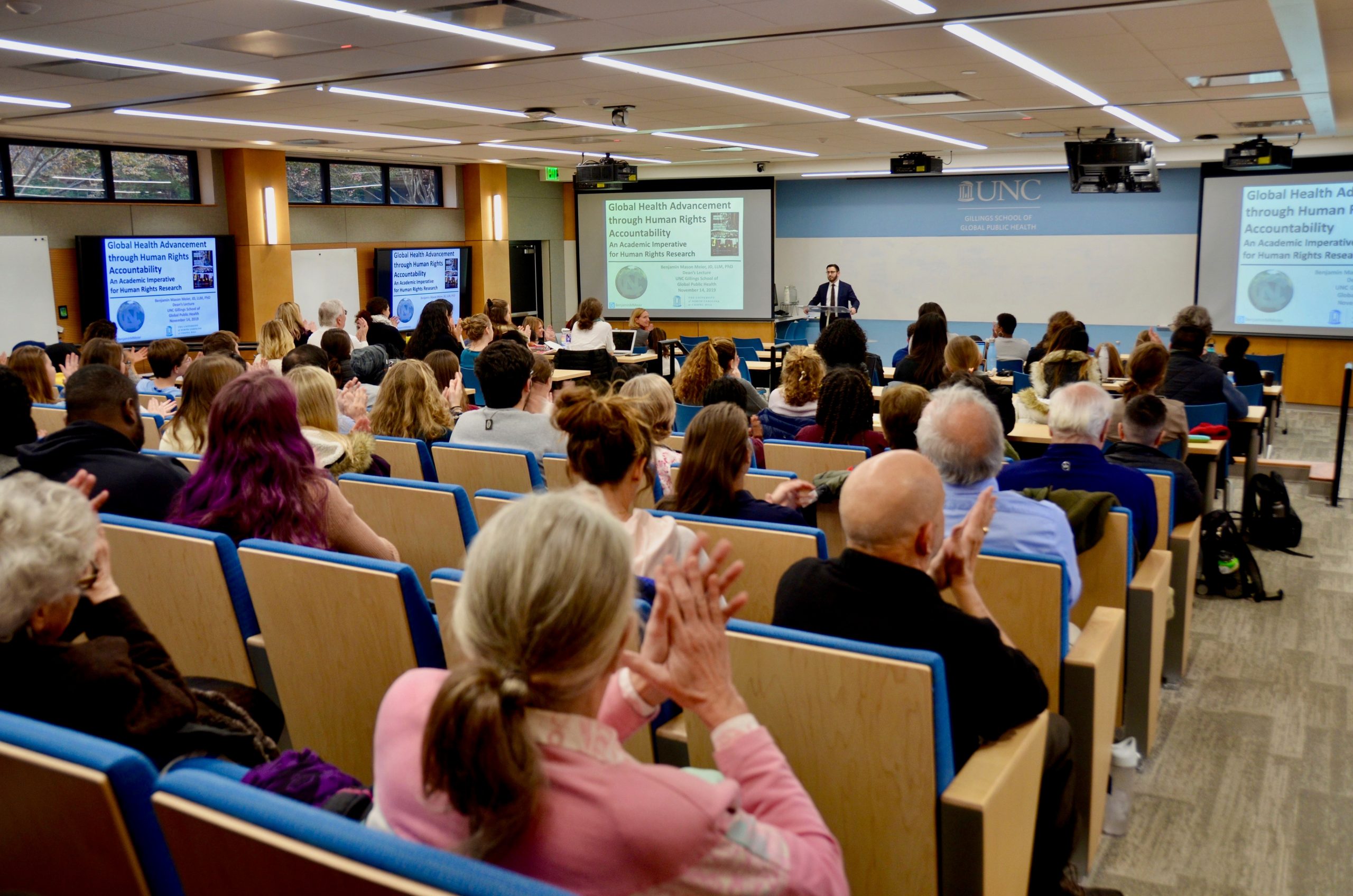 2019
2019
As the inaugural lecture in the Dean’s Lecture Series at the Gillings School of Global Public Health, UNC Associate Professor Benjamin Mason Meier explored paths to advance global health through the implementation of human rights. Raising an imperative for public health research to understand the impact of human rights on global health, Professor Meier shared his comparative analysis of global health governance, Human Rights in Global Health: Rights-Based Governance in a Globalizing World, as a basis to facilitate accountability for human rights in global health.
2020
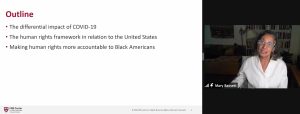 Examining inequities in U.S. health outcomes amidst the COVID-19 pandemic, Dr. Mary Bassett, the Director of the François-Xavier Bagnoud (FXB) Center for Health and Human Rights at Harvard University, delivered the first online lecture in this lecture series. In addressing how the pandemic has disproportionately affected Black Americans and other communities of color, Dr. Bassett argued that longstanding structural inequities in this country reflect who we are and how we have organized our society, displaying their cost in human lives.
Examining inequities in U.S. health outcomes amidst the COVID-19 pandemic, Dr. Mary Bassett, the Director of the François-Xavier Bagnoud (FXB) Center for Health and Human Rights at Harvard University, delivered the first online lecture in this lecture series. In addressing how the pandemic has disproportionately affected Black Americans and other communities of color, Dr. Bassett argued that longstanding structural inequities in this country reflect who we are and how we have organized our society, displaying their cost in human lives.
2021
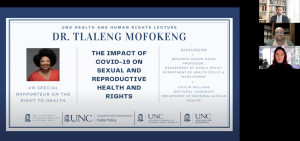 The second year of the pandemic brought a second online lecture to the Health & Human Rights Lecture Series, with Dr. Tlaleng Mofokeng, the United Nations Special Rapporteur on the right to health, addressing the impact of COVID-19 on sexual and reproductive health and rights. This conversation with “Dr. T” considered how the pandemic has challenged underlying determinants of sexual and reproductive health, discussing the need for an intersectional framework to support marginalized populations and decolonize global health.
The second year of the pandemic brought a second online lecture to the Health & Human Rights Lecture Series, with Dr. Tlaleng Mofokeng, the United Nations Special Rapporteur on the right to health, addressing the impact of COVID-19 on sexual and reproductive health and rights. This conversation with “Dr. T” considered how the pandemic has challenged underlying determinants of sexual and reproductive health, discussing the need for an intersectional framework to support marginalized populations and decolonize global health.
Highlighting the application of human rights law to global health advancement, this Lecture Series has proven effective in elevating human rights from principle to practice and transforming international law into national policy. The growth and influence of this Lecture Series is a testament to the Department’s efforts to cultivate interdisciplinary health and human rights discourses at the UNC.
